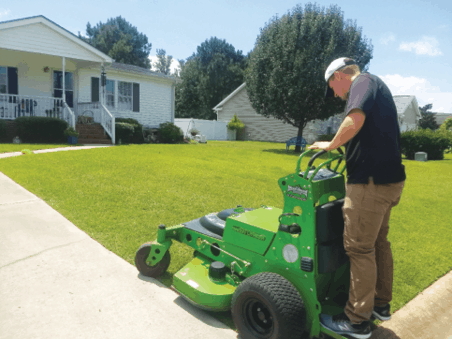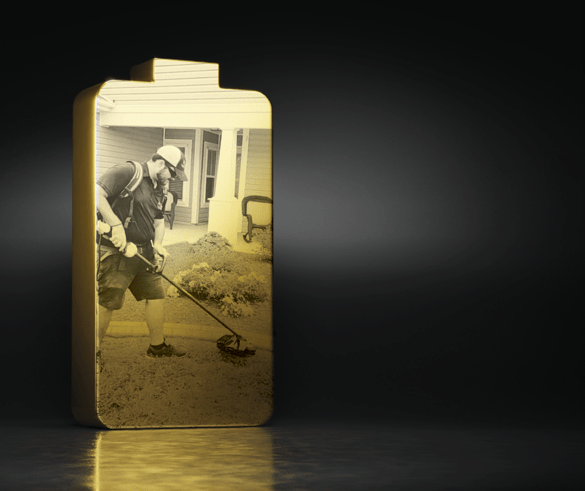© Mrak | Adobe Stock
By Kim Lux
Source: www.lawnandlandscape.com, February 2021
As battery-powered equipment continues to advance, more landscapers may be open to making the investment.
Could battery-powered equipment be the future of the industry?
Austin Hall, president of Greenwise in Evanston, Illinois, and Michael Reed, owner of Quiet Lawn in Longs, South Carolina, believe that’s where things are headed.
The primary advantages of the equipment seem to be threefold – better for the environment, better for crews and less noise pollution.
Hall, who admits Greenwise is still using a mix of gas- and battery-powered equipment as they make the transition to fully electric, says making a conscience effort to help the environment was the motivating factor.
“Our company is an organic lawn care company and sustainable landscape maintenance and design business,” he says. “Sort of everything we do is around the idea of sustainability and our tagline is ‘lighten your footprint.’ We use organic fertilizer, all-natural weed control products and have been thinking about ways we can lighten our footprint in respect to our emissions.”
Reed says he chose to use battery-powered equipment to stand out from the competition.
“It was so different than what anybody else was doing,” he says. “That’s what really pushed me in this direction.”
Getting the right gear.
Reed says that as more electric equipment hits the market, Quiet Lawn uses a wide range of it.
“We use a standard, zero-turn commercial mower and handheld electric equipment,” he says. “Pretty much everything we use is electric – from our blowers, edgers, trimmers and chainsaws. It’s rare that we have to use a piece of gas-powered equipment. If we have to rent a piece of heavy equipment, that’d be our only exception.”
Greenwise also continues to add battery-powered equipment.
“We’ve been using battery-powered hand tools, primarily blowers, for the past four or five years,” he says. “We also have two battery-powered mowers. They are 33-inch mowers and we find them very effective. Increasing, over time, we’re going to transition our propane-powered mowers to battery-powered ones. Eventually, we expect to be 100% battery-powered.”
While some doubt the strength of battery-powered equipment, Reed says in his experience it’s been comparable to gas-powered, and appeals to him.
“When I used gas equipment, I’d get headaches from smelling the fumes all day,” he says. “You don’t get that with the electric.”
No noise, no problem.
As Greenwise continues to transition to fully electric, they launched a new route.
“This year, we’ve launched an all-electric maintenance crew, which uses battery-powered mowers, battery-powered line trimmers, hedge trimmers and edgers,” Hall says. “Basically, everything that comes out of the trailer is battery-powered for that specific crew.”
Robyn McMurray Hurtig, director of community engagement at Greenwise, says the new service couldn’t have come at a better time.
“People are home trying to have conference calls and working from home and they’re hearing landscapers with these gas-powered blowers and it’s driving people crazy,” she says. “We’ve had a lot of requests for electric and we wanted to honor that and lead the charge in our area.”
McMurray Hurtig adds Greenwise started piloting the new route in the spring, and the response has been overwhelmingly positive.
“It’s been very well received,” she says. “I’ve talked to a few of the customers, and one in particular talked about how she really used to dread the day her landscape service would come because it was so loud. When we came with our all electric crew, she couldn’t even tell when we left.”
Reed says that having no noise pollution is also what leads clients to his company as well.
“Our customers really appreciate it,” he says. “We are a lot less intrusive on their lives. We’re in a big area for retirees. Probably 95% of our customers are retired, so we don’t want to be waking them up at 8 a.m. We try not to disturb them.”
“Three years ago, people would almost laugh at you when they heard you had an electric lawn service. Now, people come up to you like you’re a rock star and are asking about your equipment.” Michael Reed, owner, Quiet Lawn
Change isn’t easy.
While Hall and Reed are certainly happy to sing the praises of battery-powered equipment, they do recognize that it can pose some challenges.
“I think one thing that might prevent certain companies from adopting this technology is just the upfront investment that’s required for mowing equipment,” Hall says. “If you’re going to buy a typical 36-inch walk-behind mower, it may be double the cost.”’
Reed says that while the upfront costs are indeed higher, the equipment tends to pay for itself in the long run with less maintenance costs and not having to purchase fuel.
In addition to price, Reed says that companies could run into problems if they aren’t keeping up with charging.
“You can’t stop at a battery station if you run out of battery. That’s the only thing. You’ve got to have plenty of batteries and a good charging system,” he says.
Hall and Reed also say they’ve had to work hard to get their crews on board with the electric equipment.
“There is a bit of a learning curve because it does feel different then a piece of gas equipment when it’s in your hand. There’s also a different procedure because you’ve got to make sure everything is charging overnight,” Reed says.
Hall says getting his crews to slow down and recognize the benefits of the equipment was difficult at first.
“Culturally, we’ve had to work through with our crews on what it means to use battery-powered equipment because the work gets done, in some cases, a bit more slowly,” he says. “It’s typical in the industry that crews want to use the equipment that has the most power so they can work efficiently, so it’s been a mindset change with our employees.”

Pricing it right.
Both Reed and Hall say that location plays a major role in pricing and determining whether to charge a premium for electric lawn care.
“We’re in a unique geography, in some of the villages, in and around Evanston, we’re actually restricted from using gas-powered blowers for a period of the season,” he says. “So, it’s been the standard for some time. In that case, we don’t price the service higher.”
However, Hall says there is a pricing premium for the new, all-electric service.
“(It’s) not really because of the cost of the equipment … but because we find it takes more time to complete the service,” he says.
Reed chooses not to charge more for electric lawn care and keeps his prices competitive.
“It depends on the area someone is in. In my area, being environmentally friendly isn’t really a hot thing. If I was in an urban area where that’s much more of a big deal, I would definitely market the environmental aspect and try to charge a premium,” he says. “For me, I’m right there with the other good companies around here. We aren’t the lowest and we aren’t the highest.”
Green growth.
According to Reed and Hall, the technology behind electric equipment has come a long way, and they expect it to continue improving.
Hall said that he’s had his crews demoing some of the latest equipment and they’ve been pleased with the results.
“For some time, we thought battery-powered blowers just didn’t have the muscle for spring and fall cleanups,” he says. “Our crews are telling us they could be, and it’s been very encouraging for us.”
Hall suggests anyone considering using the equipment give it a test run first.
“There are a lot of companies out there that are willing to allow landscape contractors to demo equipment,” he says. “It helps you understand the range of options.”
Reed says he goes to trade shows every year and each year he is seeing battery-powered equipment have more of a presence.
“It’s amazing the switch in the industry and how fast the industry is heading toward electric,” he says. “Three years ago, people would almost laugh at you when they heard you had an electric lawn service. Now, people come up to you like you’re a rock star and are asking about your equipment.”
He feels the industry will continue to get behind the technology and says eventually it will become the norm.
“Within 10 years, the majority of the industry will be headed in this direction,” he says. “People who pay attention can read the tea leaves and see that’s where it’s headed. It just makes sense with the price going down and the capacity going up.”

